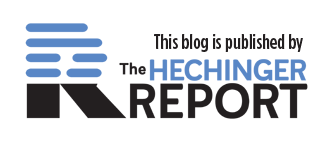The New America Foundation, a non-partisan think tank in Washington headed by Anne-Marie Slaughter, is calling for more federal funds and school time for teachers to use student data to change how they teach. The report, “Promoting Data in the Classroom,” written by Clare McCann and Jennifer Cohen Kabaker, was published on June 4, 2013.
There’s a ton of education data out there now. Every state in the nation now maintains a longitudinal data system that tracks each student’s test scores year after year. (That’s thanks to more than $620 million in federal funds for setting up state data systems since 2005, plus additional Race-to-the-Top grants). But McCann and Kabaker make the argument that, for the most part, they’re not being used by teachers to figure out how to teach their students better.
McCann and Kabaker describe recent efforts in Oregon and Delaware to get teachers to actually use the data. In both cases, it was time consuming. One Oregon school district got the school board to approve a later start time to the school day so that teachers could pore over data in the morning. Other schools set aside regular blocks of time during the school day for teachers and administrators to meet. Delaware hired professional data coaches from Wireless Generation, a private company now owned by Rupert Murdoch’s Newscorp. The idea was to examine the data and plan instructional changes, such as when to use whole group versus small group or individual instruction. Or the teachers could identify which students need additional help. Some teachers were resentful that it was taking away from conventional lesson planning. Many teachers struggled to find the required hours. And McCann and Kabaker point out there’s only so much you can do with year-end test data.
What data freaks really want are so-called “formative” tests that children take many times through the year so that you can see how much they’re learning before the year is over when there’s still time to make adjustments. But formative tests are at their infancy and there’s a lot of push back against adding more tests to the school year. Oregon didn’t have any formative assessments, but it is now starting some pilots.
The results?
In Oregon, schools that participated in the data program tended to see their reading scores increase more than schools that didn’t participate. It’s important to note that the participating schools tended to be lower performing at the start, back in 2008. By 2012, the students of the data-analyzers had, on average, surpassed the reading scores of the non-analyzers, but just by a hair (80.52 vs. 79.62). It was not as rosy in math. Students of the data analyzers did improve and close the achievement gap. But the non-analyzers were still outperforming the analyzers at the end.
In Delaware there is no data on whether the data coach program is working. That’s because Delaware was experimenting with other reforms at the same time and it’s difficult to say how much of a role the data analysis alone had on student achievement. But the state department of education is working to produce an independent analysis.
Delaware benefited from Race to the Top grants to fund its data coach program, but McCann and Kabaker are worried that Congress will cease funding it in 2014. Even President Obama’s budget doesn’t include any Race to the Top money for elementary and high schools.
Instead, the authors point to the “Improving Teacher Quality State Grants” program for advocates of data-driven instruction. It is currently used for class-size reduction and teacher training programs. The authors want Congress, when it reauthorizes the No Child Left Behind Act, to explicitly promote the use of data training projects with these funds instead. The authors also want the Department of Education to redesign the statewide longitudinal data systems grants to reward proposals that focus on the use of data, not just the existence of the data.



